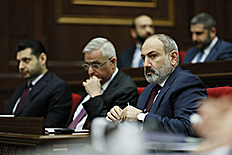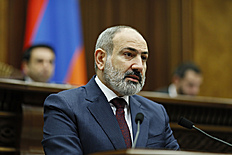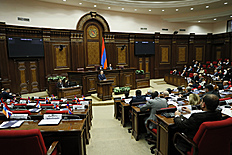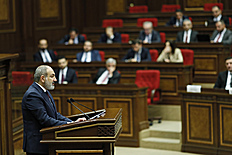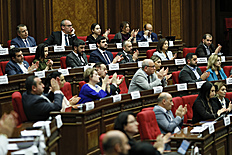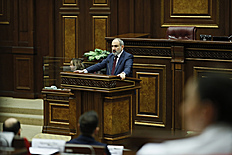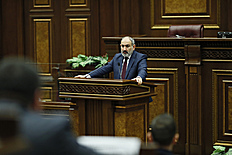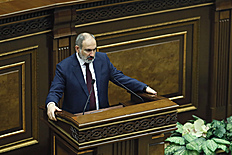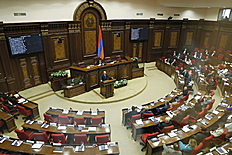Statements and messages of the Prime Minister of RA
Prime Minister Nikol Pashinyan's speech at the National Assembly during the discussion of the performance report of the Government Action Plan for 2021
more 6 photos
Honorable President of the National Assembly,
Dear Vice Presidents,
Distinguished Members of the National Assembly,
Dear members of the Government,
We are discussing the 2021 annual report on the implementation process and results of the Action Plan of the Government of the Republic of Armenia.
2021 was the first post-war year, and during the year we had serious failures and serious achievements. I would like to first talk about the achievements, then focus on the failures, but not so much or not only to record them, but taking the opportunity of being in the high tribune of the National Assembly, to confess to the supreme legislative power of the country and therefore, to the public, to cover the cause and effect of the war and defeat, to provoke a conversation about possible solutions.
Of course, the cornerstone of our achievements in 2021 is the early parliamentary elections. Why do I think so? Because the elections that took place after the catastrophic war showed the resilience of our statehood and people, our will to have a statehood, raised the international reputation of the Republic of Armenia and recorded our commitment to democracy and democratic values.
I have said it many times, but I consider it appropriate to repeat now that for the first time in the history of the Third Republic, the elections in 2021 became a method to overcome the internal political crisis, but not the cause of the internal political crisis.
After the 44-day of the catastrophic war, in the atmosphere of public unrest and riots, attacks and threats, the political majority found the strength to maintain and defend the status of the people as the supreme power by holding early parliamentary elections.
Armenia not only overcame the internal political crisis through the electoral processes of last year, but also, according to international institutions, made a transition from a country of "electoral authoritarianism" to a country of "electoral democracy." With this, in fact, Armenia entered the supreme league of democracy, and this is a key achievement.
The next major achievement of 2021, which is of institutional importance, was the maintenance of macroeconomic stability in the difficult post-war period, which was also exacerbated by the internal political and Covid-related crisis, the uncertain security environment and the trepidations. Under these conditions, it was not only possible to maintain the stability of public administration and economic stability, but also to make a distribution of an unprecedented amount of Eurobonds ($ 750 million) with the lowest interest rate of all state issuances. That is, with the lowest interest rate compared to all previous issuances. In 2021, the reputable international rating agencies "Fitch" and "Moody's" reaffirmed the ratings given to Armenia with a "stable" outlook, assessing the level of creditworthiness as "reliable", attaching importance to the Government's ability to manage existing risks.
By rating Armenia for the first time, Standard & Poor's gave us a rating with a "positive" perspective, substantiating it with the Government's ability and practice to maintain macroeconomic stability and pursue a reasonable and reliable macroeconomic policy. These are very high and important assessments for a war-torn country. And these assessments were confirmed in practice, showing the financial and economic resilience in parallel with the political resistance of our country.
As a result, the tax revenues of the 2021 state budget exceeded the planned by 147 billion AMD.
In other words, in the post-war crisis year, the Government not only did not cut expenditures, but also had the opportunity to finance additional expenditures. A significant part of these additional expenditures was directed to the solution of the socio-economic problems of Artsakh, which was wounded by the war. And against this background, when from November 2020 to the end of 2021 the Government implemented programs worth 136 billion AMD in Artsakh and envisaged 144 billion AMD in funding from the 2022 budget, there are people who dare to say that Armenia has washed its hands of Artsakh. Armenia has never, I repeat, never supported Artsakh as much as it does now. But Deputy Prime Minister Mher Grigoryan will address this topic in more detail in his speech.
Returning to the budget indicators of 2021, I must say that in the reporting year we have made an unprecedented amount of capital expenditures, 100% compared to what was planned at the beginning of the year. There has never been such an indicator in the history of Armenia. The absolute index of capital expenditures of 2021 was also unprecedented in the history of the Third Republic - 217.8 billion AMD. At the same time, the amount of capital expenditures in 2021 exceeded the same indicator of 2018 by about 24.7 billion AMD and 65.8 billion AMD of 2019. 92.3% performance of the adjusted capital expenditure plan is the highest indicator of the last four years. In 2020 it was 84.9%, in 2019 - 73.5%, and in 2018 - 74.0%.
As a result, the number of jobs by December 2021 was 659,471, which is an absolute record for the entire history of the previous period of Armenia. Compared to the same month of 2020, the increase in job number was 6.1%, compared to the same month of 2019 - 4.9%, compared to the same month of 2018 - 12.1%. The average and gross salary recorded a significant increase.
We consider the increase of financing of capital expenditures and the increase of efficiency to be one of the important factors for the solution of the socio-economic problems facing the country, because in this way new jobs are created, salaries are increased. This is also the reason why the Government has planned capital expenditures of about 350 billion AMD for 2022, which will be 60% more than last year 's capital expenditures. I want to emphasize that we have a political decision not to reduce capital expenditures in any scenario of economic development. Let me remind you that the capital expenditures of the budget are carried out through the private sector and I hope that first the Government will be able to regulate this process in a propper way, and the business will be able to fulfill the Government order in high quality, at the right time. In fact, this is one of the mechanisms for the practical implementation of the formula “Become rich, make rich” proposed by us in 2018.
Dear Colleagues,
Several other macro indicators can also be listed under the success subheading of 2021. But the negative part prevails in our emotions for 2021.
The number of victims of the 44-day war is 3825 by today’s data. Most of their bodies were found or identified by DNA test and buried in 2021. Our state flags, which are constantly and endlessly waving in the cemeteries, are the main symbol of 2021 and the question that does not abandon us and is stuck in our throats is why it happened. I have to answer this question myself and now I am going to do it.
I have initially accepted my guilt and responsibility for both the war and the defeat. But I have not accepted and I do not accept the accusations addressed to me by the opposition after November 9, 2020, accusing me of surrendering lands, and thus, also of treason. At first glance, this may seem absurd, that you admit guilt, but do not accept the accusation, and perhaps the time has come for this dilemma to be resolved.
In a recent interview, I hinted that if I was to be accused objectively, I should not be accused of surrendering lands, but of not surrendering lands. And now, yes, I want to admit that I'm probably guilty of that.
It is my fault that in 2018, 2019 I did not stand in front of our society and did not voice that all, I repeat, all our friends, close and not so close friends, expect us to surrender the 7 famous regions to Azerbaijan in one way or another and bring down our benchmark for the status of Artsakh. I am guilty for I did not tell our people that the international community unequivocally recognizes the territorial integrity of Azerbaijan, expects us to recognize it, and expects that the Azerbaijanis who left Karabakh should be fully involved in deciding the future of Nagorno Karabakh and and its governance.
I am guilty for not saying clearly and unequivocally that even the scenarios unacceptable to us were not accepted by Azerbaijan and the representatives of the international community sometimes told us clearly, sometimes diplomatically, that if all this is accepted by the Armenian side, Azerbaijan still has to be convinced to accept it. I had to present all this in detail to our people.
And not doing all this is my real fault, and such a formulation of the accusation is not an attempt to alleviate the situation at all, but on the contrary, it aggravates it, because by surrendering, I might have saved thousands of lives, but by not surrendering, I actually became the author of decisions that resulted in thousands of victims. And perhaps a well-known proverb was born for such cases, which says: it's more than a crime, it's wrong. Or as we would say, it's more than a betrayal, it's wrong.
Dear Colleagues,
Dear people,
The complexity of the situation is that this is not the end of the story, because it is one thing to talk to the public and the people about it in time, another thing to convince the people of the need for concessions, and the third, to bring all that to life.
In order to talk about it with the people at the time, I first had to convince myself that it was the right way. And I confess, I could not convince myself. And why could not I convince? For the same reason as a number of our opposition partners are unable to come to terms with reality to date, and this reason can be conditionally formulated as follows: "Sanasar or Kubatli, Zangelan or Kovsakan?" For the same reason as a number of parliamentary partners of Artsakh and Armenia still refer to not only Shushi and Hadrut, but also the 7 regions when talking about Artsakh’s territorial integrity, which are still considered part of the Artsakh Republic by the Artsakh legislation.
I could not convince myself also because for 25 years we have been telling the Armenian society that all the deprivations we have suffered and are suffering have a great goal and that goal is the freedom of Artsakh. All the hardships we face is for the sake of having powerful army, and it is difficult to believe that an army built on so much hardships will not be able to defend our dream.
I could not convince myself, because the geopolitical centers generally thought in the same direction, in the sense that everyone unequivocally recognizes the territorial integrity of Azerbaijan, but they were not united in the logic of the events that would take place after the potential surrender and the contradictions that had already intensified in Syria, Libya, Georgia, Ukraine, and finally in Nagorno-Karabakh, would definitely lead to an explosion.
I could not convince myself, because when I was getting acquainted with the negotiation documents, I realized that Serzh Sargsyan did not exaggerate anything when saying that Armenia was ready to abandon the 7 regions, but each time Azerbaijan made new demands and that Azerbaijan's expectations were unrealistic and unacceptable to us.
I could not convince myself because I realized that Robert Kocharyan was not exaggerating at all when he stated that Armenia also has a problem of territorial integrity.
I could not convince myself, because it was difficult to be convinced that after 30 years of hardship, one can simply surrender the fruits of victory and get nothing in return. To accept this would mean to admit that by declaring a state we had created a façade and completely and utterly failed the institutional establishment of the state. Even after being in opposition for many years, I could not admit it to myself, and, moreover, I could not announce such a decision and verdict looking into people's eyes.
But, dear colleagues, I am not saying this now to start a dialog about the past, I am saying this to start a dialog on the future. Because we have the same situation now in terms of content and I do not want to repeat the same mistakes. I do not want, I can not fail to say this directly and honestly to the highest legislative body and the people of the country.
Today the international community clearly tells us that being the only country in the world that does not recognize the territorial integrity of Turkey's ally Azerbaijan is a great danger not only for Artsakh but also for Armenia.
Today the international community tells us again “Lower your benchmark on the status of Nagorno Karabakh a little and ensure greater international consolidation around Armenia and Artsakh”.
Otherwise, says the international community, please do not rely on us, not because we do not want to help you, but because we can not help you.
Dear attendees,
Dear people,
A recent conversation with a high-ranking foreign official left a deep trace in my mind. That official said that his people faced a dilemma 7 times in the last 200 years. To fight or not to fight? There were cases when they decided to fight and succeeded, there were cases when they decided to fight and failed, there were cases when they decided not to fight but were unable not to fight because they were forced to fight. But by and large, this question is constantly raised before the peoples, because there is a terrible fact: In the world today, or in the old world, there are either no or very few countries that are satisfied and happy with their borders and consider them fair, but somewhere, somehow, it must be stopped, and that official is grateful to his generation, who made the decision to stop and, perhaps, were able to implement that decision.
Dear people,
These are the social psychological motives that make us, and personally me, to more and more consistently and confidently assert that the peace agenda has no alternative for us, despite all the difficulties and hardships. What I said is not really easy to say, it is not really easy to make the decision to say it all.
But if God and the people have made an unexpected and illogical decision for many that after the 44-day war I must continue to lead the country and the people, saying all this and taking responsibility for all this is my mission, my cross, which I have to carry. And since it becomes a speech of confession, and since it is Holy Week, I must also confess that I also feel infinitely guilty before God that I could not fulfill one of His greatest commandments - Blessed are the peacemakers: for they shall be called the children of God
But let us not to succumb to emotions, because now more than ever we need sober judgment, a rational approach and a realistic assessment. And in this context, I would like to touch upon a number of recent events, agreements and plans, talk about risks and opportunities, threats and hopes.
First of all, about the the agreements based on the results of the trilateral meeting held on April 6 this year in Brussels. Yes, I have agreed that the Foreign Ministers of Armenia and Azerbaijan should begin preparations for a peace treaty. What this means in practice, what schedule, what format, still needs to be discussed and decided. But signing a peace treaty with Azerbaijan as soon as possible is part of our plans.
But I must say that we do not have illusions here either, because we do not rule out that Azerbaijan will try to bring the peace talks to a deadlock as soon as possible, making it an opportunity for new aggression and aggressive actions against Armenia and Artsakh. We have the same concern, by the way, in relation to delimitation works, because we do not rule out that Azerbaijan will use this process to formulate territorial claims against Armenia, de jure declaring that it has no territorial claims.
Understanding and calculating all the risks and challenges, we have come to the conclusion that standing at the same point and not making any progress in the process not only does not reduce but also exacerbates the risks. That is the reason why we reached an agreement on delimitation in Brussels - to set up an Armenia-Azerbaijan bilateral commission on delimitation and border security by the end of April and start working.
What is our strategy in this regard? To clarify the official positions of Azerbaijan on border issues, to officially register the position of Armenia on the same issue, to be maximally legitimate in our positions, that is, to use only de jure facts and arguments in the border clarification issue, to gain recognition of that legitimacy in the international community and reach an agreement on Armenia-Azerbaijan border based on it.
What does this mean? This means in the process of delimitation to rely on facts de jure relevant to the clarification of the territory of the Republic of Armenia and not on wishes or rumors, because I have already mentioned a about the dangers of such a practice.
After Brussels, I was intensively criticized for abandoning the offer of a simultaneous withdrawal of troops. In this regard, I must say that we have stated several times before that the simultaneous withdrawal of troops has never been a precondition for us and we just think that a normal delimitation process is possible only for borders where there is a certain level of security and stability, which unfortunately we cannot say about the current Armenian-Azerbaijani border.
Our concern that Azerbaijan wants to maintain military tensions along the border parallel with the delimitation process in order to justify territorial aspirations and formulate new aspirations towards Armenia has finally been perceived by the international community, but we have already reached a dangerous point where the offer of a simultaneous withdrawal of troops could be perceived as a policy of bringing the situation to a standstill. That is why, as I said at the March 31 Cabinet meeting, we are ready to show flexibility, and we have shown that flexibility in Brussels, hoping that the international community will pay more attention to the security environment along the border.
I would like to emphasize that the delimitation agreement was not reached from scratch in Brussels, but the agreements reached in Sochi on November 26, 2021 were finalized, but all this also created a basis for the Russian Federation, the Western and the other partners, if necessary, to provide the necessary support to the delimitation of borders with their information and experience.
It should be noted that the bilateral commission on delimitation and border security, as the name implies, will have a double mandate. The first is the delimitation work, the second is the provision of security and stability along the border. This means that the commission will have some authority to monitor the border situation, as well as the opportunity to come up with a concrete proposal to increase the level of security and stability at the border. If necessary, it will be possible to involve international expert potential in this process.
I would also like to inform you that we are currently working on the format and staff of the commission and we must try to clarify the staff by April 30 at the latest. In the meantime, our relevant officials must work with the Azerbaijani side and reach a common ground on this organizational issue.
Returning to the topic of the peace treaty, I must remind you that we have repeatedly stated our readiness to start this process. On March 10, one of the OSCE MG Co-Chair countries conveyed to us Azerbaijan's views on the basic principles of the peace treaty.
These principles are as follows:
- Recognition and respect for each other's sovereignty, territorial integrity, inviolability of internationally recognized borders, political independence,
- Recording the absence of territorial claims against each other and de jure recording the obligation not to make such claims against each other in the future,
- a mutual commitment not to pose a threat to each other's security, territorial integrity or political independence in interstate relations, including by the use of force, and not to take any action incompatible with the goals of the United Nations,
- delimitation and demarcation of borders and establishment of diplomatic relations,
- Unblocking transport and other communications, creating new communications, and cooperating in other areas of mutual interest.
We have operatively discussed these proposals and stated that there is nothing unacceptable in them for Armenia, especially sinceArmenia, de jure, recognized the territorial integrity and inviolability of borders of Azerbaijan by ratifying the Agreement on the Establishment of the Commonwealth of Independent States in 1992, and that recognition is still part of our domestic legislation.
We have stated that Armenia has never had territorial claims from Azerbaijan and the Karabakh issue is not a matter of territory but of rights. Therefore, we have stated that the security guarantees of the Armenians of Karabakh, the provision of their rights and freedoms and the clarification of the final status of Nagorno Karabakh are of fundamental importance for Armenia.
Therefore, with this a complement to the agenda, Armenia is ready for the start of peace talks, and this position was stated during the last meeting in Brussels. What is important to record in this situation? A very powerful nuance, that if in the past we placed the status of Karabakh in the basis, deriving security guarantees and rights from it, now we place security guarantees and rights in the basis, deriving status from it. In other words, we state that the status quo is not an end in itself, but a means to ensure the security and rights of the Armenians of Nagorno-Karabakh.
I would like to emphasize another innovation in Armenia's policy on this issue. As in the case of demarcation, the strengthening of the international legitimacy of Armenia's position on the status of Nagorno-Karabakh is extremely important for us, and in this respect, the resolution of the lawsuit that Armenia filed against Azerbaijan in International Court of Justice on September 16, 2021 is essential. The lawsuit is based on the Convention on the Elimination of All Forms of Racial Discrimination and we hope that the resolution of the lawsuit, which unfortunately will not take place very quickly, will be a significant factor in protecting the rights of Armenians of Nagorno-Karabakh and will raise the bar of the perception of international community on NK status.
But even today we must emphasize that Azerbaijan, through its actions, makes more and more grounded our claim accusing that country of pursuing a policy of national hatred. One such action was the infamous military trophies park opened in Baku, which displayed mannequins of bleeding Armenian soldiers, and smiling Azerbaijani schoolchildren being photographed in the park under state support. The mentioned mannequins, by the way, were taken out as a result of the decision of the international court.
The most recent evidence of Azerbaijan's racist policies is the events in the village of Parukh in Nagorno-Karabakh and the events that preceded it. First, Azerbaijan blew up the only gas pipeline to Nagorno-Karabakh at a time when unprecedented cold weather was raging in Karabakh. It took 11 days for the pipeline to be restored, but it also turned out that during the repairs, Azerbaijan had installed a valve on the pipeline, which was closed on the day when unprecedented amount of snow fell in Karabakh, up to 1.5 meters, and the air temperature dropped to minus eight. This anti-Armenian action was in fact a continuation of that for a long time Azerbaijan had been urging the residents of a number of villages in Karabakh to leave their villages in Armenian and Russian languages through loudspeakers, otherwise threatening to force them out. These announcements were accompanied by illuminating the houses of the villagers at night hours with flashlights and inviting Muslims to pray over loudspeakers, reciting the Adhan. This is nothing but a manifestation of religious terrorism and, on the other hand, a discrediting of Islam.
But the story of the invasion of the village of Parukh in Nagorno-Karabakh, which is in the responsibility zone of the Russian peacekeeping contingent, showed that Azerbaijan is not going to be satisfied with psychological terrorism and that the eviction of Armenians from Artsakh through armed terrorism is one of its main tasks.
Of course, there are also questions related to the activities of the Russian Federation peacekeeping force in Nagorno Karabakh. But at the moment we consider it important that the Russian peacekeeping force take measures to remove the Azerbaijani units from its area of responsibility.
This is an absolute necessity and a serious trial for the peacekeeping mission of the Russian Federation in Nagorno Karabakh. By the way, I would like to deviate from the text here and to say that the fact that yesterday the peacekeeping unit of the Russian Federation did not allow a group of deputies of the National Assembly of the Republic of Armenia to enter Artsakh causes confusion. Why does it cause confusion? Because this practice contradicts the provision of the November 9 trilateral statement that the Lachin corridor is designed to ensure the connection between Nagorno Karabakh and Armenia. And by the way, I want to say that no inspection function in the corridor is provided, moreover, to ban or block the movement of the deputies of the National Assembly, because that corridor is for ensuring the connection between Nagorno Karabakh and Armenia. And we can add this nuance to what has been said.
Continuing the topic of Azerbaijan's racist policy, I would like to emphasize that one of the most important proofs of this is the formation of a working group in the ministry of culture of Azerbaijan for abolishing the Armenian inscripts on Armenian churches. We must use all these facts in detail in the International Court of Justice. We must substantiate these facts with the need to launch effective mechanisms for the protection of the rights of the Armenians of Nagorno-Karabakh.
And, of course, we must use these facts to substantiate our positions in the peace negotiations and ensure their international legitimacy.
As for the actual process of organizing peace talks, yoo know that, recording our positions, we transferred them to Azerbaijan through the OSCE Minsk Group co-chairing countries, stated that on that basis we are ready to start peace talks and asked the Co-chairs to assist in organizing peace talks or to organize those negotiations.
In Brussels, the Foreign Ministers of Armenia and Azerbaijan were instructed to begin preparations for the future peace treaty and to hold talks and contacts in this direction. Following the publication of this information, we were criticized for actually abandoning the idea of holding talks under the auspices of the OSCE Minsk Group.
The reality is a little different. We have not abandoned on that idea, we support that idea, but you also know that the relations within the Co-Chairs are extremely tense due to the events in Ukraine. By the way, this tension started back in 2011 with the events in Syria, which inevitably had an impact on our regional developments. And now, given this tension, we cannot passively wait for the Co-chairs to act, on the other hand, the start of bilateral talks in no way prohibits the involvement of the Co-chairs in the process. And we will support that idea.
And yes, we are convinced that the preparations for the process should start immediately and we should hope that the Ministries of Foreign Affairs of Armenia and Azerbaijan will be able to fulfill the given instructions in due time. It is important to note that today the entire international community is ready to support the process, and this opportunity must be truly seized.
Despite all that, the direct involvement of international partners in a number of issues on the peace agenda is visible to the naked eye. You know that there is an Armenia-Russia-Azerbaijan trilateral working group on the opening of regional communications, co-chaired by the Deputy Prime Ministers. This does not prevent us from discussing this issue with our partners in the EU, the US, France, Iran and Georgia. In addition, during my last telephone conversation with the President of the Russian Federation Vladimir Putin, we agreed to intensify the work of the trilateral working group.
By the way, Azerbaijan is trying to bring the process to a deadlock here as well, trying to turn our interest in opening the roads into a corridor-related dialogue. But as I have stated many times, this approach is absolutely unacceptable to us. It is noteworthy that Azerbaijan is trying to implement the agenda of opening regional communications in such a way that as a result, the blockade of Armenia will not be overcome, but, on the contrary, will deepen, or making it a new justification for an aggressive policy towards Armenia. This is the reason why we must show maximum flexibility in this issue while clearly defending our principled positions and the territorial integrity of Armenia.
Honorable President of the National Assembly,
Distinguished Vice Presidents,
Distinguished Members of the National Assembly,
Dear members of the Government,
At the beginning of my speech I promised to also talk about our failures in 2021 and as such I should mention the invasion of the Azerbaijani units on May 12, 2021 into the sovereign territory of the Republic of Armenia in the Sotk-Khoznavar section. Why did that failure happen? In order to get the answer to this question, the incident should be viewed in the context of a number of important events that preceded it.
On May 10, 2021, the National Assembly of the Republic of Armenia was dissolved by force of law and our country entered the round of early parliamentary elections, and it is clear that one of the motivations for the invasion two days later was to paralyze Armenia's state institutions and statehood, to create pre-election and post-election chaos, and to have a concrete impact on the election results. We can directly say that it was also an attack on Armenia's democracy.
But the context of the May invasion will remain incomplete if we do not take into account the events of February, when the General Staff of the Armenian Armed Forces openly engaged in politics, issuing a statement demanding the resignation of the government. It should be noted that the opposition, whose former leader admitted that during the war he called on the generals to point their rifles at the Armenian government building instead of at the enemy, finally achieved its goal and it turned out that there are forces in the army that are more interested not in what is happening at the border, but what is happening at the Republic Square, Baghramyan Avenue, Melik-Adamyan Street.
The politicization of the armed forces, the involvement in political intrigues has once again shown its catastrophic consequences, and when we look back at many events, sometimes it seems that military failures are simply necessary for some to motivate power change in Armenia. Of course, this may seem like a conspiracy, but the analysis lead to such thoughts. The apparent appearance of a number of high-ranking military officials in the opposition field immediately after their resignation, and in fact before the resignation, confirms the hypotheses I had spoken about before the well-known events.
Many of them make opposition speaches today, while they have been personally responsible for a number of failures for which the Government is blamed today.
Anyway, the long-term politicization of the army, its full involvement in corruption chains became one of the systemic wounds that brought us to the brink of disaster. And I mean not only the direct effects but also the related effects. It is against the background of the irresponsibility, politicization and oppositionization described above that, as it turned out recently, spy networks formed by Azerbaijan operated in the Armenian Armed Forces.
We can say this based on the exposures made by the National Security Service so far, which already raise serious questions.
But it is obvious that as a result of politicization, the paralyzed state of the army for about a month and a half in February-April 2021 had a direct consequence in the form of the invasion of the Sotk-Khoznavar section and these events made the army reform agenda more urgent, one of the main goals of which should be the professionalisation of the army, transforming the conscription service system into regular reservist training, similar to what we now do with quarterly training.similar to what we now do for quarterly training. Ideally, this should be repeated several times in a person's life, at regular intervals.
Dear colleagues,
What happened in the Sotk-Khoznavar section is certainly the failure of the Armed Forces and the government. But how the Collective Security Treaty Organization reacted to what happened, I think, was a failure for the organization as well. Contrary to existing procedures, the CSTO has not yet made a decision to carry out monitoring in the area of the developments, justifying long-held fears among the Armenian public that the organization, which is crucial to Armenia's security system, will do nothing at the necessary moment, remaining an observer. The fact is that so far the CSTO has not addressed this situation in any way, even as an observer.
The Azerbaijani Armed Forces continue to be present in the Sotk-Khoznavar section, posing a real threat to the security of the Republic of Armenia. But I also want to state that the 45 square kilometers occupied under these events unfortunately is not the only one in the Republic of Armenia. About 70 square kilometers have been in that status since the early 1990s, and as I said, our policy is to observe the solution of the issue in the context of the delimitation and demarcation commission.
Dear colleagues,
It is clear that in the current difficult geopolitical situation, the Republic of Armenia must pursue an active foreign policy, and the international contacts held at the level of the Prime Minister give a certain idea of that activity.
In 2021, I had four bilateral meetings with the President of the Russian Federation Vladimir Putin, four meetings with the Prime Minister of Georgia Irakli Garibashvili, three meetings with the President of the European Council Charles Michel, two meetings with the President of the Islamic Republic of Iran Ebrahim Raisi. I also had bilateral meetings with the President of France Emmanuel Macron, the President of Cyprus Nicos Anastasiadis, the Prime Minister of Lithuania Ingrida Šimonytė. Through the mediation of the President of the Russian Federation Vladimir Putin, the President of the European Council Charles Michel, the President of France Emmanuel Macron, I have met three times with the president of Azerbaijan.
The key and main goal of all these contacts is one. In this new situation, to better understand what the world thinks and wants and to make what we think and want more understandable to the world, at the same time to make what we think and want more in line with global trends, to pursue a maximally balanced foreign policy, to pursue a foreign policy of balancing. In this sense, I attach importance to our regional policy. We are trying to further intensify our traditionally active contacts with Iran and Georgia, at the same time starting talks with Azerbaijan and Turkey. Of course, we do not have any illusions here, but I think it is obvious that the conversation should continue with the aim of becoming a real dialogue and it is in the state interests of the Republic of Armenia.
The state interest, the state interest of our country is the factor that should become our motivation in all actions.
Dear colleagues,
I would like to end my speech with a very important note and express my joy that despite such difficult and turbulent times, the government did not stopped the policy of reforms even in 2021 and we also have visible results in this area. Among the most important institutional reforms, I would like to mention the establishment of the Patrol Police, which not only received a positive response from our society, but also contributed to the growth of trust in the police and law enforcement system in general. This process will be continuous and the Patrol Police must be introduced throughout the country. This week, the Patrol Police will enter Shirak and Lori Provinces, and the competition of candidates to work in the Patrol Police of Tavush, Aragatsotn, Gegharkunik and Kotayk Provinces has started. Reminding that one can also become a patrol officer without having previously served in the police, I urge potential candidates and especially women to take an active part in the admission.
The next important direction in terms of institutional reforms is general education. You are aware that for the first time in the history of our country, the state standard of pre-school education has been adopted, which means that the state has a completely new attitude towards the education of children, taking the process very seriously. Our understanding is that kindergarten or preschool is not a place where parents temporarily leave their children. Kindergarten and preschool are a place where the foundations of children's education are laid and making compromises here means to confront the fact that illiteracy, which left our country in the middle of the last century, is creeping back unnoticed.
Our program to build 500 kindergartens in Armenia by 2026 has been launched, and this should not only make education truly accessible to all children in our country, but also give young mothers the opportunity to replenish the workforce, to show public and economic activity. Promoting women's social and economic activism is one of our most important tasks, because women are the majority of our population and without their active support it will be very difficult to overcome the serious problems facing the country.
The next important institutional change in the field of general education along with the construction of 300 schools and the adoption of the state standard of general education, is the process of voluntary certefication of teachers which also started in 2021 and should be continuous. With this process we will solve two important issues in the medium term. We will exclude the entry of unqualified teachers into the school and we will create a mechanism for the continuous increase of teachers' salaries. This process has already begun, and as a result of voluntary certification in 2021, the salaries of about 400 teachers have increased by 30 to 50 percent.
Did you know that the funding of science from the state budget in 2022 has increased by 82.8% in our country, which is an unprecedented indicator. But this is not a purely financial increase, but an introduction of a new institutional system in the field of science, as a result of which science as a form of activity will become attractive not only to young people, but also to scientists engaged in non-professional work. As a result of the reforms that have already begun, the salaries of science workers have increased by 40 to 165 percent.
Due to lack of time, I cannot talk about all the reforms implemented in 2021, but among the most important ones I must mention the full transition to proportional representation of the local government elections, which is one of the most important tools for accomplishing democratic institutions in our country.
We continue the consistent and principled fight against corruption and for that we are forming new institutional structures, such as the Anti-Corruption Committee, established in 2021, the practical phase of the illegal property confiscation system was launched in 202, in the sense that concrete confiscation lawsuits are submitted to the courts. The Anti-Corruption Chamber of the Court of Cassation is being established. And I think you all see that in the fight against corruption there are no former or incumbent officials for us and we will consistently advance this process.
In terms of institutional reforms, I must attach importance to the adoption of the new Criminal Procedure Code, which introduced:
1) conciliation proceedings, which allow to agree on the issues of punishment, compensation of damages, return of property of criminal origin in case of acceptance of the accusation;
2) cooperation proceedings, which allow exposing new crimes with the expectation of receiving a lenient sentence or release from punishment in general;
3) proceedings conducted in the absence of the accused, which allows an investigation to be carried out into cases where the accused avoids it and leads to a deadlock. The new Criminal Procedure Code introduces house arrest and administrative control precautionary measureas an alternative to detention, the application of which will be possible from January 1, 2023. The new Criminal Code defines the type of restriction of liberty as an alternative to imprisonment, the application of which will be possible from July 1, 2023. The new Criminal Procedure Code defines the type of restriction of liberty as an alternative to imprisonment, the application of which will be possible from July 1, 2023.
But even before all these innovations come into force, I must proudly state that after the Non-violent, velvet, popular revolution of 2018, Armenia continues to be a country of half-empty penitentiaries. The Council of Europe's 2021 crime statistics were published last week.
According to that, in terms of the prison population density of 100 detention places, Armenia is ranked among the countries with the lowest index - 36.8 people, that is, 36.8 out of 100 prison places are occupied in our country. This speaks of the complete elimination of the problem of overcrowding in Armenian penitentiaries. It is noteworthy that in terms of prison population density, according to the results of 2021, Armenia is second only after Monaco and has significantly better indicators compared to other European countries. During this time, two penitentiaries were closed in Armenia.
I cannot but emphasize the political significance of this indicator, and this is really an indicator specific to a democracy and worthy of a democracy. From time to time our government is accused of trying to persecute political opponents, carry out political persecution and establish a dictatorship.
It is a historically proven fact that in such countries, where there is persecution, prisons are opened and not closed. In such countries, prisons are overcrowded, not half-empty. This, of course, does not mean that in today's Armenia all those who should be in prison according to the letter of the law are in prison. This means that everyone who should be free is free. And this is how we see Armenia. But on the other hand, of course, we must take into account that many crimes, including several key episodes of the November 9, 2020 attacks, including the assassination attempt on the President of the National Assembly, have not been revealed yet, and our law enforcement agencies must do everything possible to find some vacant places in prisons for their rightful owners.
Honorable President of the National Assembly,
Distinguished Vice Presidents,
Distinguished Members of the National Assembly,
Dear members of the Government,
Beyond all these facts, beyond successes and failures, our concern is for the provision of security of Armenia and Artsakh and the more than severe escalating challenges. We need to make unusual and supernatural efforts to protect and preserve our statehood, independence, sovereignty and territorial integrity, and we must admit that we have not yet been able to establish a credible system of guarantees in this area.
But we are guided by the logic that the most effective guarantee of security is peace. This is the reason why opening an era of peaceful development for our country and region has been adopted as a state strategy. For achieving this goal, for internationally advancing the peace agenda, the Government pursues an active, balanced international and regional policy, and we expect the continuous support of our people to address this vital issue.
We do not want to show the reality as a better one to our people, and we must all realize that the challenges we have known since the time of Pap King, Ashot the Iron, King Hethum, and the First Republic have come to us today in full force. I want to emphasize again that we are at the most decisive point in the history of the Third Republic, a point where the Armenian statehood has found itself more than once.
And in order not to end up in a similar way we did at that same historical points, we need unprecedented flexibility, a complete non-emotional state. We need full consolidation around our state and state institutions, we need civil and national unity built around our state interests. We need new ways of thinking. And we must bring our ship to the safe haven in this turbulent geopolitical ocean.
And I'm confident we will do that, and that's our historic mission. Thank you.
